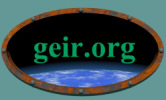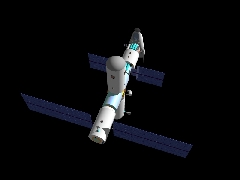
 |
|||||||
|
|
|
|
|
|
|
|
|
|
Sub-Orbital |
Orbital |
LEO Station |
Mission Statement |
Lunar Orbit |
Lunar Surface |
Mars and Beyond |
An orbital delivery system requires an orbital destination. Given the cramped nature of the orbital
vehicle, expeditions of more than one week's duration will require a space
station in earth orbit to allow expedition members to stretch their legs or
perform meaningful tasks.
The Leo Earth Orbit (LEO) station will be assembled entirely from modules capable of transport in the LOV. The LEO station will be cramped, but expandable through a series of standardized modules and connectors.
The initial operational launch of the LOV will deliver the first module of the LEO station. This "Mini-Mir" module will consist of two 2 meter diameter, 2 meter long airlock and equipment modules, and a 3 meter long, nearly 3 meter diameter living module. Equipped with life support, solar arrays and attitude control, this 5 mt station will be able to support a crew of two or three people for up to a month and will allow immediate occupancy of the station. The second module launched will be a "Mini-bus" connector and storage module that will provide the backbone of the station, providing six connector ports, 3 independently pressured sections, and conduits to transfer atmosphere, water, coolant, power and data between modules. The third module will be an engineering module equipped with large solar arrays and batteries, command and control equipment, and additional attitude control equipment; it will form the heart of the growing station.
Later launches can add three person habitation modules, lab modules, additional "Mini-bus" connectors and larger solar power modules to the growing station. A cargo LOV launch with an integral "Mini-bus" module can provide periodic re-supply of the station. Once the station grows, the "Mini-Mir" module or others like it can act as independent platforms for specialized needs.
And once the MOV launcher becomes operational, larger station modules can supplement the LEO station or serve as the core for a larger station.
All pages and images ©1999 - 2005
by Geir Lanesskog, All Right Reserved
Usage Policy
![]()